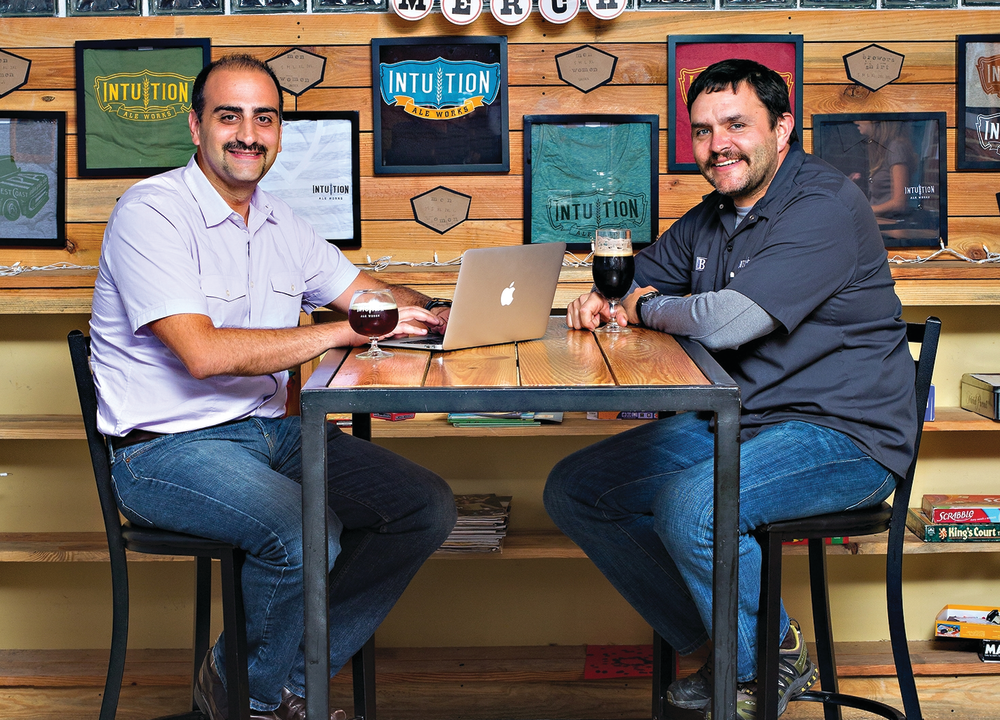From the January 2013 Issue.
Finding a market demand for something you are passionate about doing is often a route to success for small business owners. The often cited Confucius quote sums it up well: “Choose a job you love, and you’ll never work a day in your life.” Of course, when it comes to turning that passion into a functional business, there will be days when you do have to “work,” particularly when managing the numerous modern demands businesses face.
For Ben Davis, the calling is his love of beer. As the owner and head brewer of Intuition Ale Works (www.intuitionaleworks.com), he not only enjoys drinking the suds, but also brewing specialty craft beers. The brewery, which celebrated its second anniversary in November 2012, is based in Jacksonville, Florida, where it has production facilities and a tap room.
In its two years, Intuition Ale Works has grown to about a dozen employees, and more than doubled its beer production to 2,600 barrels in 2012. At 31 gallons per barrel, that’s more than 80,000 gallons of beer, which is sold in their Tap Room, and is also distributed in kegs to more than 180 restaurants, bars and liquor stores in northern Florida. The company was the first craft brewery in the state of Florida to offer canned versions of three of its more popular brands. The beers, People’s Pale Ale, Jon Boat Coastal Ale and I-10 IPA, are available in about 60 retail locations in the state.
He was among the first specialty craft beer brewers in the Jacksonville area, where the business activity was only recently allowed. That was welcome news for Ben, who had attended the rigorous brewer’s certification program at the Siebel Institute in Chicago, and then had been perfecting his craft in his Jacksonville garage for more than two years.
Although relatively new to Florida, small craft breweries have been greatly successful throughout other parts of the country, with enthusiastic customers attracted to a greater variety of flavorful ales, lagers, IPAs and other styles, which are made with higher quality ingredients. For many, it’s also the concept of supporting locally-owned businesses.
“The local beer movement is popular because local beers are always fresher and people know where it came from,” Ben noted. “With the major international brands, the beer may have been brewed across the country and then shipped and stored for who knows how long. Local is always fresher.” He noted that most beer varieties are best within two weeks or so of brewing.
Through his training, he also learned of the many regulatory hurdles, as well as the back office accounting, payroll and reporting requirements. He had prior experience in running businesses, first as the owner of a popular wine and tapas bar, and then through his wine production experience in the vineyards and wineries of Napa Valley and New Zealand. Still, he didn’t get into the booze business to do paperwork, so before he launched the brewery, he sought the expertise of Chris Farmand, a local CPA (www.cfarmand.com) he knew through a mutual friend.
“I know what my strengths and weakness are,” Ben said. “I wanted to stay focused on the brewing processes and coming up with new beers. I’m better at marketing and conceptual functions, not the bookkeeping. So, I turned to Chris to help run the business.”
Coincidentally, Chris had started his accounting practice at about the same time, after several years working in a family firm. . The Jacksonville CPA has developed several “thought points” and suggestions that a potential brewer should consider before opening a brewery. One of the most important, Chris notes, is ensuring good back office procedures.
“Bookkeeping, payroll, brewer’s reports, tank labels and brewing & packing schedules are only a few of the items you must keep in order to ensure your financial fitness. Don’t skimp on the back office expense for the sake of saving a few dollars in the beginning.”
On his blog (www.apr16.com), Chris has posted on several reasons that he is exited and passionate about small breweries like Intuition Ale Works. Among them is their contribution to the economy at many levels, their involvement within the community and, for beer lovers, the more “luscious, succulent ingredients that craft breweries use.”
One of the first steps the CPA helped the brewery with was selecting the bookkeeping and business management system they would use. For bookkeeping and payroll, Chris helped them get started with a hosted version of QuickBooks, so that Ben could access business data from anywhere. At the same time, this allows Chris to have day-to-day, or as-needed, access to all back-office operations, including managing invoicing, payables, receivables, reconciliation functions, and monthly and annual financial reporting.
Chris also helps manage compliance issues to the seven different local, state and federal agencies that the business has to report to for sales and liquor regulations. He works with another area CPA to manage the business’ income taxes.
In addition to having more complex regulation concerns than most other small businesses, breweries also have many unique business processes they have to manage. Because of this, they need specific features and reporting tools that aren’t available in QuickBooks. For these functions, they looked at specialty systems.
“We looked at two different programs that are designed for brewery management, and we ended up choosing BeerRun Software (www.beerrunsoftware.com),” Ben noted. “It was more our speed, and the other main program on the market was far more expensive and a lot more complex than we needed.” The system is web-based and integrates with QuickBooks, which was also a key in the selection process. Chris also helped train Ben on both software systems.
Although he’s more focused on financial aspects, it’s easy to see that Chris shares much of the love of craft brewing. “Two years ago I was given the awesome opportunity to help Intuition Ale Works,” he said. “While I spend most my time doing back office work, I can still feel the energy. The smells, employees, fork-lifts, tanks, patrons, all exude positive energy.”
Cheers to their mutual success!
Thanks for reading CPA Practice Advisor!
Subscribe Already registered? Log In
Need more information? Read the FAQs
Tags: Taxes




